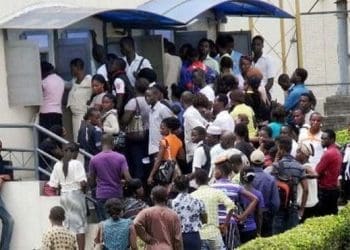The National Investment Bank (NIB) is set to undergo a major turnaround as the government prepares a bold recapitalisation plan to restore the bank’s financial health and strategic relevance.
At the heart of this new direction is the inauguration of a new Board of Directors by the Minister for Finance, Dr. Cassiel Ato Forson, in a ceremony held in Accra.
Dr. Forson used the occasion to underscore the government’s commitment to restoring NIB’s credibility and capital strength, revealing that a comprehensive recapitalisation programme will be unveiled during the upcoming Mid-Year Budget Review in Parliament.
“NIB was turned into a political football. But that ends now,” Dr. Forson stated firmly.
“We have taken a bold decision to recapitalise the bank, and details will be provided in the mid-year budget review.”
The Finance Minister acknowledged that the bank’s troubles were deeply rooted in years of mismanagement, unsustainable lending practices, and political interference.
However, he expressed confidence that with new leadership and a focused strategy, the bank could recover and contribute meaningfully to Ghana’s industrialisation drive.
New leadership, new vision for NIB
The newly constituted nine-member board is chaired by seasoned banker Mr. Frank Adu Jnr., the former Managing Director of CAL Bank.
He brings to the role over two decades of experience in financial management and turnaround leadership.
“I am honoured by this appointment and grateful to the Finance Minister for the trust reposed in us,” Mr. Adu stated.
“We know the bank’s history. We know the expectations. And we intend to work with management, staff, and stakeholders to return NIB to profitability and impact.”
The full composition of the new NIB Board are Mr. Frank Adu Jnr. – Chairperson, Dr. Doli-wura Awushi Abdul-Malik Seidu Zakarai – Managing Director, Dr. Othniel Ekow Kwainoe – Member, Ebenezer Kwaku Addo – Member, Dr. Mrs. Mercy Naa Aku Ofei-Koranteng – Member, Dr. Shani Bashiru – Member, Mr. Max George Cobbina – Member, Dr. Kwasi Akyem Apea-Kubi – Member and Dr. Alfred Attuquaye Botchway – Member
The new board is expected to bring technical depth and a renewed commitment to transparency, commercial viability, and strategic lending in alignment with Ghana’s industrial development goals.
2024 performance
NIB’s financials for the 2024 fiscal year paint a picture of fragile recovery, with operational improvements tempered by continued structural weakness and poor capitalisation.
Despite government support in recent years, the bank remains significantly undercapitalised, falling below the Bank of Ghana’s minimum capital requirements.
According to internal performance data for the year ended December 2024 total assets stood at GH₵5.1 billion, up 4% from GH₵4.9 billion in 2023.
Customer deposits rose modestly to GH₵3.7 billion, a 3.4% year-on-year increase.
Gross loans and advances amounted to GH₵2.2 billion, with non-performing loans (NPLs) still above 25% net interest income reached GH₵204 million, a slight improvement from GH₵190 million in 2023.
Profit before tax was GH₵12 million, marking a return to profitability after two consecutive years of losses.
Capital Adequacy Ratio (CAR) was estimated at just 7.6%, far below the regulatory threshold of 13%
The bank continues to struggle with high legacy debts, underperforming loan portfolios, and a weak internal control system — all of which have dampened investor and depositor confidence in recent years.
Strategic reorientation ahead
NIB, originally established to serve as Ghana’s premier development finance institution for industrial growth, has over the past two decades drifted into commercial banking without achieving sustainable profitability.
The new board is now tasked with returning the bank to its foundational role in supporting agro-processing, manufacturing, and SME-led value chains.
Government sources indicate that the forthcoming recapitalisation package may include a combination of direct capital injection, asset clean-up, and governance restructuring, supported by new strategic objectives aligned with the Ghana CARES ‘Obaatanpa’ programme and the Ghana Industrial Transformation Agenda.
Dr. Forson was unequivocal in his message: “We will no longer pour good money into bad structures. This board must make hard decisions to restructure the bank and protect public funds. This is not about politics. It is about performance.”
A turning point for Ghana’s oldest investment bank
NIB’s future now rests on how swiftly and effectively the new board and management can implement reforms, restore operational discipline, and attract long-term capital to support real sector lending.
With public scrutiny intensifying and fiscal space tightening, expectations are high that this latest reform effort will not repeat the mistakes of the past.
The Mid-Year Budget Review in Parliament, scheduled for later this month, is expected to reveal the full scope of the recapitalisation plan — a crucial lifeline for NIB, which has teetered on the edge for far too long.














